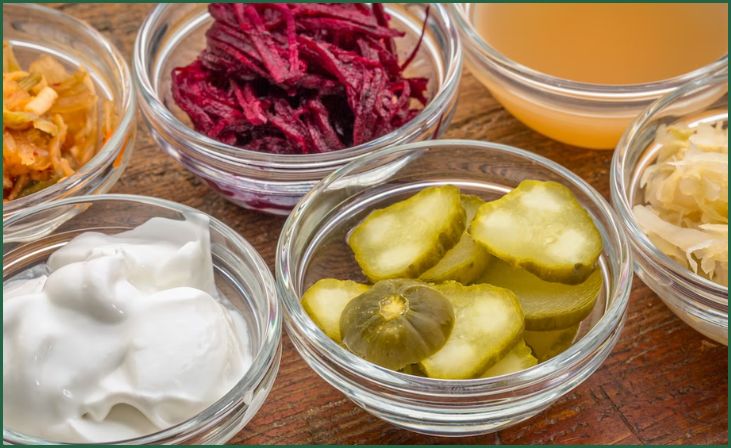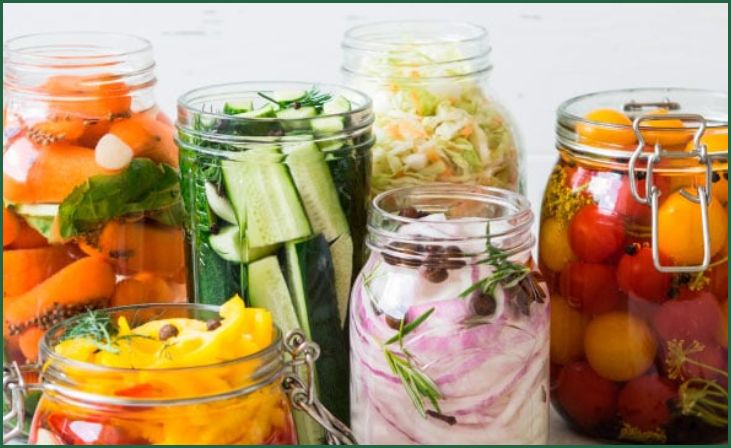Fermented foods have been making a comeback in recent years, and for good reason. Beyond their tantalizing taste, these foods offer a treasure trove of health benefits that can positively impact your well-being. Let’s dive into the fascinating world of fermented foods and explore the three amazing health benefits that might just convince you to make them a staple in your diet.
In a world where wellness trends come and go, the resurgence of interest in fermented foods is more than just a fleeting fad. These foods, teeming with natural probiotics and a burst of flavors, have stood the test of time. The health benefits associated with their consumption are nothing short of amazing, and we’re here to unravel the science behind the hype.
Table of Contents
ToggleWhat are Fermented Foods?

Before we delve into the health benefits, let’s understand what fermented foods are. Fermentation is a natural process where microorganisms like bacteria, yeast, or mold break down food components such as sugars and starches. This not only preserves the food but also enhances its nutritional value. Think sauerkraut, kimchi, yogurt, and kombucha – these are all examples of the diverse world of fermented foods.
3 AMAZING HEALTH BENEFITS OF FERMENTED FOODS

1. Probiotic Power for Gut Health
Benefit:
- Improved digestion
- Enhanced nutrient absorption
- Balanced gut microbiota
Ingredients:
- Cabbage: 1 head, finely shredded
- Carrots: 2, grated
- Sea salt: 1.5 tablespoons
- Caraway seeds: 1 teaspoon (optional)
- Filtered water
Instructions:
- In a large bowl, mix shredded cabbage, grated carrots, sea salt, and caraway seeds.
- Massage the mixture for about 10 minutes until it releases its juices.
- Pack the mixture tightly into a clean glass jar, ensuring the vegetables are submerged in their own juices.
- Add filtered water if needed to cover the vegetables.
- Place a weight on top to keep the vegetables submerged, and cover the jar loosely.
- Allow it to ferment at room temperature for about 1-2 weeks.
- Taste the sauerkraut; once it reaches your desired flavor, refrigerate.
2. Enhanced Nutrient Absorption with Kombucha
Benefit:
- Increased bioavailability of nutrients
- Rich source of antioxidants
- Supports liver function
Ingredients:
- Black or green tea bags: 4
- White sugar: 1 cup
- Kombucha SCOBY (Symbiotic Culture Of Bacteria and Yeast)
- Filtered water: 1 gallon
Instructions:
Don't just scroll, subscribe!
BuzzTrail's unique web-stories are the cure for boredom you've been waiting for.
- Brew tea bags in hot water, add sugar, and let it cool to room temperature.
- Transfer sweet tea to a clean, large glass jar.
- Add the SCOBY to the jar along with 1-2 cups of previously made kombucha.
- Cover the jar with a cloth and secure with a rubber band to allow for airflow.
- Let it ferment for 7-14 days, depending on your taste preference.
- Once fermented, remove the SCOBY and reserve some liquid as starter for the next batch.
- Bottle the kombucha, adding flavors like ginger or fruit if desired, and refrigerate.
Read Also: Improved Health with Fermented Foods
3. Immune Boosting Kimchi
Benefit:
- Supports the immune system
- Anti-inflammatory properties
- Rich in vitamins A and C
Ingredients:
- Napa cabbage: 1, chopped
- Radishes: 6, thinly sliced
- Carrots: 2, julienned
- Garlic cloves: 5, minced
- Ginger: 1 tablespoon, grated
- Red chili flakes: 2 tablespoons
- Fish sauce or soy sauce: 3 tablespoons
- Sea salt: 1 tablespoon
Instructions:
- Combine cabbage, radishes, carrots, garlic, and ginger in a large bowl.
- Sprinkle salt over the mixture and massage it until vegetables release their juices.
- Add chili flakes, fish or soy sauce, and mix thoroughly.
- Pack the mixture into a clean, airtight jar, pressing down to remove air bubbles.
- Leave the jar at room temperature for 2-3 days, then refrigerate.
- Enjoy the tangy and spicy kimchi as a side dish or in various recipes.
These three fermented foods not only provide a burst of flavor to your meals but also deliver a myriad of health benefits. Experiment with these recipes and discover the wonders of incorporating fermented foods into your daily diet.
Read Also: Best 8 Fermented Foods for Gut Health and Digestion
Top 10 Health Benefits of Homemade Fermented Foods

Fermented foods have taken the spotlight in recent times, and for good reason. Beyond their tantalizing taste, these foods boast a plethora of health benefits that contribute to overall well-being. Let’s delve into the top 10 advantages of incorporating homemade fermented foods into your diet.
- Probiotics: Fermented foods are rich in beneficial bacteria, or probiotics, which promote a healthy balance of gut microbiota. This can enhance digestion and absorption of nutrients.
- Improved Digestion: Fermentation breaks down complex compounds in food, making them easier to digest. This can be particularly beneficial for individuals with digestive issues.
- Nutrient Boost: Fermentation can increase the bioavailability of nutrients in foods. For example, it can enhance the levels of certain vitamins and minerals, making them more accessible to the body.
- Immune System Support: A significant portion of the immune system resides in the gut. The balance of beneficial bacteria from fermented foods may positively impact the immune response, promoting overall health.
- Gut Health: Fermented foods contribute to a healthy gut environment by fostering the growth of beneficial bacteria. This is linked to various aspects of well-being, including mental health and immune function.
- Weight Management: Some studies suggest that a healthy gut microbiome may be associated with better weight management. Fermented foods can play a role in maintaining a balanced microbial community in the gut.
- Reduced Inflammation: Fermented foods may help reduce inflammation in the body, which is linked to various chronic diseases. The probiotics in these foods can modulate the immune system and lower inflammatory markers.
- Mood and Mental Health: There is emerging research suggesting a connection between gut health and mental health. The gut-brain axis may influence mood, and a balanced gut microbiome supported by fermented foods could contribute to emotional well-being.
- Better Absorption of Minerals: Fermentation can break down compounds like phytates that inhibit the absorption of minerals. This means that consuming fermented foods alongside mineral-rich foods may enhance mineral absorption.
- Heart Health: Some fermented foods, like kimchi and miso, have been associated with cardiovascular benefits. These foods may contribute to lower blood pressure and cholesterol levels.
Remember, while homemade fermented foods offer numerous health benefits, it’s important to consume them as part of a balanced diet. If you have specific health concerns or conditions, it’s advisable to consult with a healthcare professional before making significant changes to your diet.
Conclusion
The resurgence of interest in fermented foods is not merely a culinary trend but a recognition of the remarkable health benefits they offer. From supporting gut health to providing a rich source of antioxidants, these foods are a valuable addition to a balanced diet. So, why not embark on a flavorful journey of fermentation and discover the wonders it can bring to your well-being?
FAQ
Can anyone make fermented foods at home?
Can anyone make fermented foods at home?
Absolutely! With basic ingredients and simple recipes, anyone can try their hand at homemade fermentation.
Are there any risks associated with consuming fermented foods?
Are there any risks associated with consuming fermented foods?
While generally safe, individuals with specific health concerns should exercise caution and seek professional advice.
How long does it take to see the health benefits of fermented foods?
How long does it take to see the health benefits of fermented foods?
The timeline varies, but consistent consumption over a few weeks may yield noticeable results.
Can fermented foods be a part of a weight loss plan?
Can fermented foods be a part of a weight loss plan?
Yes, the impact on metabolism and digestion may support weight management goals.

